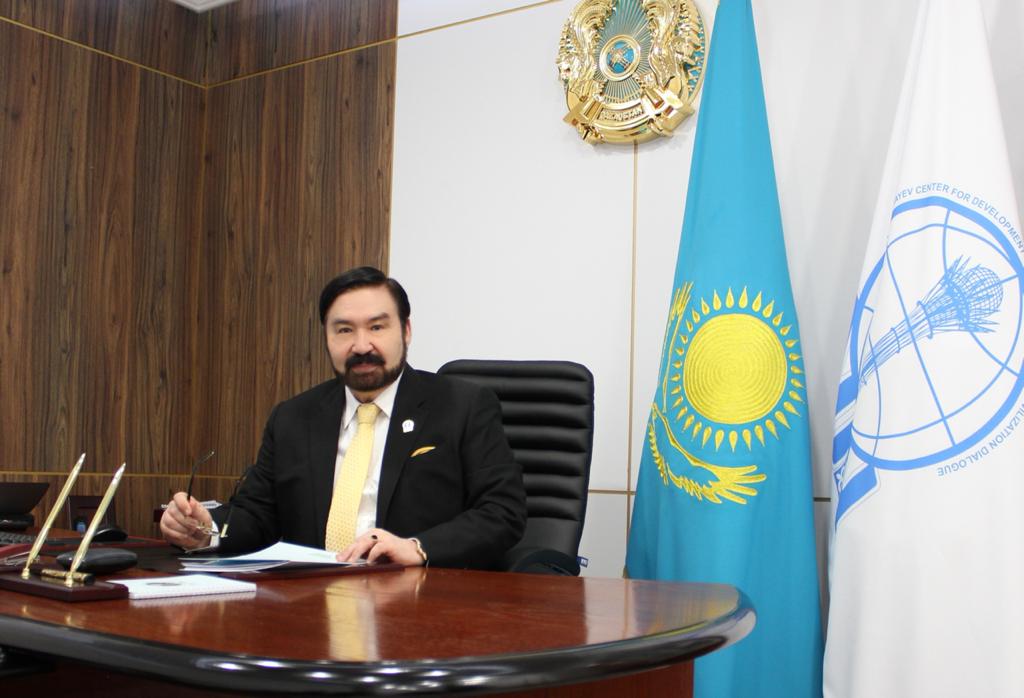NUR-SULTAN – Spirituality is what the modern world lacks, said Bulat Sarsenbayev, the Chair of Kazakhstan’s Nazarbayev Centre for Development of Interfaith and Intercivilization Dialogue, in an interview with the Astana Times.

Bulat Sarsenbayev.
Established in 2019 at the initiative of Kazakh President Kassym-Jomart Tokayev and with the support of Kazakhstan’s First President, the centre seeks to share the experience of Kazakhstan in interfaith dialogue and promote stability within the country.
“Spirituality is what the current world lacks and everyone today tries to instil spiritual values among the youth. It is very important. If a person is spiritually rich, then she or he will bring good to society,” said Sarsenbayev.
The centre works to preserve interfaith and inter-civilization dialogue, promote the ideas of the Congress of Leaders of World and Traditional Religions at the international level, suggest initiatives for the promotion of international dialogue, and expand the network of international partners to promote Kazakhstan’s international initiatives in the development of inter-civilization and inter-faith dialogue.
“Our centre is on one side a scientific centre, and research centre, or think tank. We have many functions. We have the Institute for Analysis of the Religious Situation and Religious Expertise and it is expanding,” he said.
The centre serves as a main coordinating body of the Congress of Leaders of World and Traditional Religions held in Kazakhstan. It is currently preparing for the next meeting of the Secretariat of the Congress under the leadership of Kazakhstan’s Senate Chair and Head of the Secretariat of the Congress Maulen Ashimbayev, the Ministry of Information and Social Development and the Ministry of Foreign Affairs at the end of this year and the VII congress meeting scheduled for next year.
The idea to convene the congress was put forward in 2003 by Kazakhstan’s First President Nursultan Nazarbayev when the world was witnessing the consequences of the 9/11 terrorist attacks in the United States and military operations in Afghanistan and Iraq. That was the time when Samuel Huntington’s hypothesis of the “clash of civilizations” seemed to be being vindicated.
The congress sought to become an important platform for the rapprochement of warring cultures and civilisations.
“The congress is a dialogue platform and it is a specific one. Spirituality is a barrier to all radical and extremist ideologies,” he added. “A truly spiritual person would never go for any of that.”
In past years, UN Secretary-General Ban Ki-moon, King Abdullah II of Jordan, President of Finland Sauli Niinistö, President of Israel and Nobel Peace Prize Laureate Shimon Peres, Prime Minister of Malaysia Mahathir bin Mohamad, former Prime Minister of Canada Jean Chrétien, Patriarch of Moscow and All Russia Kirill, Grand Imam of al-Azhar Muhammad Sayyid Tantawi, General Secretary of the Muslim World League Abdallah At-Turki addressed the Congress.
The last congress was held in October 2018 gathering more than 80 delegations, representatives of Buddhism, Christianity, Hinduism, Islam, Judaism, Taoism and Zoroastrianism, representatives of religious and public organisations and high-level officials.
Inviting representatives of different religions to sit at one table and discuss issues of common interest has not been an easy task.
“Only by being united, will our common goals and all integration processes for the well-being of the entire global community be achieved,” said Sarsenbayev.
Kazakhstan, with its cultural and spiritual diversity, can share its experience of maintaining peace and harmony with other countries.
“Thanks to the consistent policy of President Tokayev, Kazakhstan has become a global centre for dialogue among religions and civilizations and is open to extensive and effective cooperation in the development of interfaith and inter-civilization dialogue,” said Sarsenbayev.
The centre also seeks to promote cooperation with diplomatic missions and religious institutions.
It has partnered with the Pontifical Council for Interreligious Dialogue in the Vatican, the Abdullah ibn Abdulaziz Al Saud International Centre for Interreligious and Intercultural Dialogue, the World Islamic League and the United Arab Emirates International Institute for Cultural Diplomacy.
Sarsenbayev said he also had plans to expand cooperation with similar centres across the region of Central Asia.
